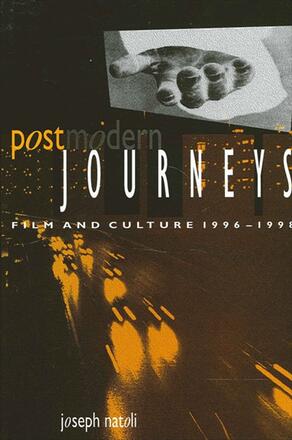
Postmodern Journeys
Film and Culture 1996-1998
Alternative formats available from:
Part memoir, part cultural criticism, this fast-paced ride through the postmodern landscape of American popular culture explores how our responses to headline events and popular films help script the ways in which we imagine ourselves and the world around us.
Description
In Postmodern Journeys, Joseph Natoli continues to chronicle how our responses to headline events and popular film help script the ways in which we imagine ourselves and the world around us. Here we clearly see how svelte marketing strategies take the present pulse of the American mass psyche in order to play to the frustrations and anxieties, the desires and hauntings that can neither be fully faced nor totally ignored. In the years covered here, films such as Fargo, Titanic, Boogie Nights, Jerry Maguire, Saving Private Ryan, and Good Will Hunting crisscrossed such headline events as the deaths of Princess Diana and Mother Theresa, a record-breaking Dow, welfare "reform," the fall of Newt Gingrich, the rise of Jesse Ventura, and, overshadowing everything, Monica Lewinsky, Bill Clinton, and Ken Starr. Somewhere in the intersection of what the record shows and how popular film and culture put us into play with that record lies the postmodern American landscape we are imagining and creating. Part memoir, part cultural criticism, Postmodern Journeys continues the fast-paced ride into that imagined time and place.
Joseph Natoli teaches postmodernism and cultural studies at the Center for Integrative Studies/Arts and Humanities, Michigan State University. He is the author of several books, including Speeding to the Millennium: Film and Culture 1993–1995, also published by SUNY Press.
Reviews
"Engaging, provocative, and full of insight into current culture, society, and politics. " — Douglas Kellner, author of Media Culture: Cultural Studies, Identity and Politics Between the Modern and the Postmodern
"Natoli's readings are provocative in the best sense of the term—even if you disagree with them, they goad you into formulating your own take on a given film. This book will appeal to anyone interested in finding accessible, highly 'teachable' forms of postmodern cultural analysis and also students of contemporary Hollywood film. Natoli's style is so engaging that you want to go along for the ride, and its accessibility will greatly enhance its attractiveness as a course book. " — Jim Collins, author of Architectures of Excess: Cultural Life in the Information Age
"What we have here is a portrait of a psychology, the psychology of an academic who has been marginalized in the profession and fought back with his mind, of a 1960s campus radical who is still fighting corporate capitalism, of a son who broke with his father and is now trying to give up that fight. " — Amy J. Elias, University of Alabama at Birmingham